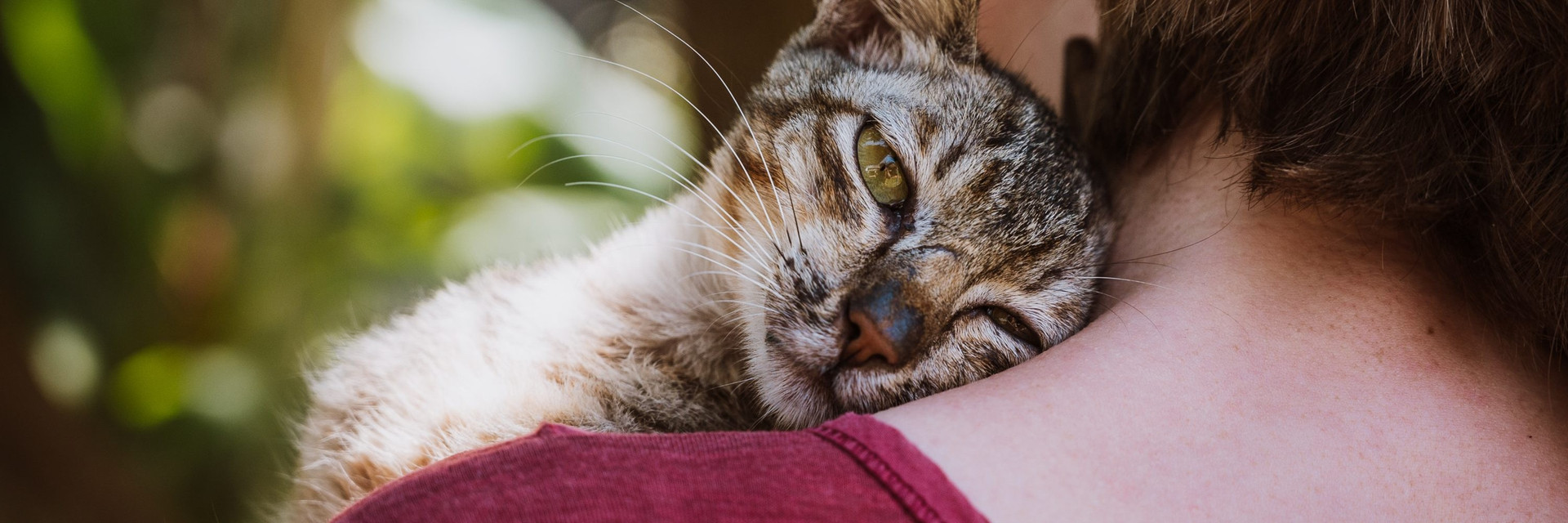
Coping with the Death of a pet
The loss of a much-loved animal can leave a huge void in your life
You have lost a member of the family, a long-term companion, a friend who has listened to you, comforted you, offered you unconditional love and accepted you just as you are.
Here we share our thoughts on how you can take care of yourself, your family and your other pets after suffering such a loss:
Allow yourself to grieve
Your day-to-day life and routines have been shaken up. Suddenly your pet isn’t there to greet you in the morning. You no longer have to prepare their food for them or take them for walks. You may struggle to accept the fact that your pet is no longer around. You may still listen out for the familiar pitter-patter of their paws. Perhaps you keep glancing at the dog or cat bed or your pet’s hutch or enclosure, wishing that they were with you.
These reactions are normal, and the road towards acceptance that your pet is really gone may be a long one. Talk to other people especially other pet owners who have gone through this experience about your feelings. This may help you during the grieving process.
Many owners have had to make the painful decision to have their pet put to sleep. If you are one of them, you may be struggling with feelings of guilt. But you did your best for your pet in ensuring their suffering was brought to an end and their passing a welcomed release.
Coping with grief
Grieving for a deceased pet is a natural process. Grief manifests itself in distinct phases, and it will take time for you to pass through them. From denial of what has happened to anger and guilt, depression and eventual acceptance – the stages of grief can take different forms for different people, and their durations may vary.
All the feelings you have are valid and should be accepted. One emotion that often brings with it pangs of guilt is that of relief. But feeling relieved is a perfectly normal response. Perhaps your elderly dog or cat needed a lot of care and attention towards the end. Perhaps you had to nurse them for a long time and watch them suffer. Taking care of an elderly or sick animal is exhausting, so feelings of relief are quite understandable, and you shouldn’t be ashamed of them.
As a grieving pet owner, you need to give yourself time to process what has happened. Sometimes it helps if you keep a diary, talk to others about your feelings or go for nature walks, all can be beneficial. If your grief for a lost pet is overwhelming, you can also seek professional help from a grief counsellor.
Supporting children
It is especially difficult for children when a pet dies. Parents should talk openly to them about their pet’s death and tell them the truth. Rather than hiding their own sadness, parents should discuss these feelings with their children. Rituals sometimes help children to cope with grief – for example, writing a farewell letter, attending the pet's funeral and adding something the pet loved to the grave or placing a pet’s favourite blanket at the graveside.
Helping bereaved pets
If any of your other pets were particularly close to their deceased friend, they may develop health or behavioural problems. They may no longer want to eat or drink, become lethargic, make whimpering sounds, fall ill or become withdrawn. Even if they weren’t best friends with the deceased pet, the changed situation in the home may upset them – especially your emotional state. Try to stick to your normal routines – even if this is difficult – particularly in the period immediately following the loss. Give your remaining pets lots of positive attention by spending time with them (walks, games, plenty of cuddles). Remember to provide them with mental stimulation too.
Getting a new pet?
Take your time to decide whether you would like a new pet. Wait until your grief has subsided. A hasty decision would be unfair to the new pet, as you might see them simply as a replacement for your deceased pet and make unfair comparisons between the two. Each animal is an individual with its own unique personality, and in that sense no pet can ever be a substitute for another one.
On the other hand, sometimes a pet that is left behind absolutely needs the companionship of another animal of the same species (for example, a guinea pig or rabbit). If that is the case, look for a solution that will most benefit the pet that is left behind. Perhaps you could bring home a new companion from a shelter, where many animals are waiting to be adopted.
 Please be careful! If you delete this page, consider that it could be used within an other language version.
Please be careful! If you delete this page, consider that it could be used within an other language version.
